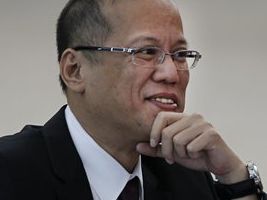Aquino fears FOI law would gag gov’t officials
MANILA, Philippines—Imagine a secretary suddenly stopping midway through his presentation in a Cabinet meeting because she or he felt that it was too sensitive for the public to know.
President Aquino raised this scenario before Inquirer editors and staff on Thursday night, saying that this was his main concern about the freedom of information (FOI) bill that would grant the public access to government records, including minutes of meetings.
The 15th Congress adjourned in June without approving the FOI bill, which was not certified as “urgent” by Mr. Aquino.
The President told the Inquirer editors he wanted to have “discussions wherein nobody is intimidated to say what they have to say.”
If the minutes of Cabinet meetings are to be made available to the public, Mr. Aquino said it may not be uncommon to hear one official telling another: ‘I’d like to say this, but this is being recorded.’”
Article continues after this advertisementThe President, who spoke to the editors after addressing a gathering of coordinators of the Asia News Network (ANN) at the Inquirer office, said he was aware that in the proposed FOI measure, transcripts of Cabinet meetings would be available to the public, except those pertaining to national security and diplomacy.
Article continues after this advertisement“National security and diplomatic concerns you can exclude; others you can include,” he said.
But Malacañang apparently wants to fine-tune the bill some more.
Another proposal would exempt the minutes or records of advice given or of opinions expressed during government policy formulation—which are invoked by the President as part of “presidential communication privilege” or when the disclosure would ostensibly undermine the free and frank provision of advice or exchange of views by public officials.
In the FOI bill, an executive order must be issued specifying the reasonable period after which this information could be made accessible to the public.
The issue of executive communication privilege became controversial after it was invoked by then Economic Planning Secretary Romulo Neri to refuse to reveal his deliberations with then President Gloria Macapagal-Arroyo on a bribe-tainted national broadband contract with China’s ZTE telecommunications company.
Presidential spokesperson Edwin Lacierda said the Executive branch has submitted its own version of an FOI bill. The House of Representatives and Senate are expected to debate the proposals.
“Let them debate it because it’s a concern for all people,” he said.
But he added: “FOI proponents need to work on their constituency. A lot of us are for it but they need to work and convince the lawmakers that FOI is good for all of us,” Lacierda said.
On the other hand, proponents of the bill point out that the framers of the Constitution had decided that freedom of information was good for all Filipinos. They included it in a new Bill of Rights, and the public gave its nod when it approved the 1987 Constitution in a referendum.
Yet lawmakers over the past 25 years have failed to pass an implementing law that would make the constitutional right to information a reality.
Public outrage, fanned by news reports and state auditors’ reports of the large-scale misuse of the pork barrel, led to last Monday’s mammoth anticorruption rally at Rizal Park. Protesters called for the passage of the FOI bill to institutionalize transparency in the government as envisioned by the Constitution.
The measure seeks to criminalize acts such as falsely denying or concealing the existence of information for disclosure, and destroying information being requested under the FOI act.
